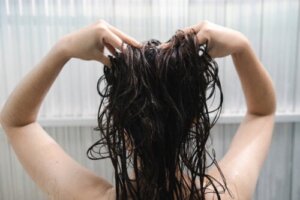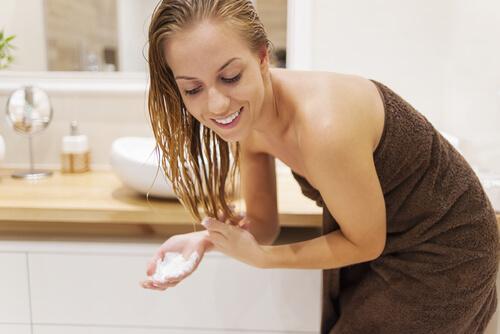Hair Exfoliation and 3 Masks You Can Make at Home

Hair exfoliation is a trendy practice. It consists of the application of certain products that facilitate the removal of dead cells, grease, and other particles that can adhere to the scalp and strands when in contact with external environments. What are the benefits?
Sources such as Offarm suggest this treatment to promote the elimination of dry dandruff and oily residues. However, it has other interesting applications. Below, we’re going to tell you what this treatment consists of and how to prepare some masks at home. Read on to learn more!
What is hair exfoliation?
Hair exfoliation is a beauty treatment that focuses on cleansing the scalp. It’s considered a complement to the cleansing products used on a daily basis, as it achieves deeper results in terms of removing dead cells and sebum control.
Now, the exfoliating product or mask of choice cannot be used on a daily basis. This depends largely on the type of hair. In fact, in the case of seborrhea or dandruff, it’s best to rely on the advice of a dermatologist.
A publication through the American Academy of Dermatology details that scalp care is determinant to avoiding certain types of hair loss and maintaining healthy hair. Hence the importance of considering the use of products such as exfoliants.
The benefits of hair exfoliation
Including a hair scrub in your beauty routine is a great idea. Often, it’s recommended to apply it once or twice a month. However, this may be different for hair that is too oily or has special needs. Here are the potential benefits.
- It keeps hair cleaner for longer: the exfoliation reaches deep areas of the scalp and the hair itself, so the cleansing is deeper. So it lasts cleaner and silkier for longer.
- It cleans scalp pores: the scalp is made up of countless pores. The hair strands emerge from these pores and it’s also the area through which they breathe. Excessive sebum production, the use of greasy products, and pollutants can cause them to become clogged. A good exfoliation will keep them free to fulfill their function and allow the hair to grow better.
- It reduces the appearance of alterations: some people believe that hair exfoliation is only for those who have dandruff, seborrhea, or hair loss. However, this is not so; exfoliating your head will actually help prevent these problems, as well.
3 exfoliating masks you can make at home
As detailed in a publication from Healthline, scalp exfoliants can be physical or chemical. These are applied through gentle massages, almost always after shampooing.
There are also some natural preparations that combine moisturizing ingredients and granules that perform the same function. In the following space, we’ll tell you about 3 different masks you can use to do this.
In case of any alteration of the scalp, a dermatological examination is recommended before trying these products.
We think you may be interested in reading this, too: Which Haircut Suits You Best? Find Out According to Your Hair Type
1. Olive oil and brown sugar exfoliating mask
Olive oil has a high content of linoleic acid and alpha-tocopherol. The former contributes to cell regeneration and allows the skin to retain water efficiently. Therefore, this mask is ideal for dry scalps that require more hydration.
The second compound, better known as vitamin E, protects skin structures against the impact of UV rays. It also acts as an antioxidant. Meanwhile, brown sugar has an astringent function that helps sweep away dead skin cells and other debris.
Ingredients
- 1/4 cup olive oil (50 ml)
- 1/4 cup of brown sugar (50 g)
Preparation
- Mix the two ingredients in a bowl until they’re well-mixed.
- Take a good amount and rub it into the scalp with your fingertips, using gentle, circular motions.
- It’s important to apply the mask to damp hair.
- After a few minutes and when you have covered the entire area, wash with plenty of water.
- Repeat once every two weeks.

2. Green tea essential oil and ground oatmeal mask
Green tea essential oil is very useful for treating problems related to excess oil. This is because it has moisturizing, antioxidant, and antibacterial properties. Also, its topical application is linked to skin rejuvenation.
As for oatmeal, scientific articles suggest that it has antioxidant and anti-inflammatory properties that contribute to skin care. Not to mention its contribution of trace elements and vitamins that, in this case, promote hair health.
Ingredients
- 15 drops of green tea essential oil
- 2 tablespoons of coconut oil (20 g)
- 1/4 cup ground oatmeal (50 g)
Preparation
- Mix the ingredients until you get a smooth paste.
- Wet the hair and apply very well over the entire scalp.
- Massage in circular motions to activate circulation. Don’t use your nails because you could hurt yourself.
- Rinse with plenty of cold water.
- Exfoliate with this mixture once a week.
3. Coffee and coconut oil hair scrub
Due to its granulated texture, coffee is another ideal ingredient for hair exfoliation. It’s recommended to combine it with coconut oil, a moisturizing product rich in amino acids, trace elements, and vitamins.
Ingredients
- 1/4 cup of ground coffee (50 g)
- 3 tablespoons of coconut oil (30 g)
Preparation
- Mix the two ingredients very well.
- Apply on your scalp after moisturizing your hair.
- Then, massage in circular motions and spread all over the head.
- Rinse with plenty of cold or lukewarm water.
- Repeat once a week.
Like this article? You may also like to read: Is It Always Necessary to Wash Your Hair After Exercising?
Enjoy the benefits of hair exfoliation!
Now that you know how important hair exfoliation is, be sure to try out the masks we’ve recommended. However, if you have any unwanted symptoms on your hair or scalp, make sure to consult a dermatologist.
Sometimes, it’s necessary to use formulated products due to the characteristics of your hair. The professional can advise you on the best option according to your needs. Keep this in mind!
All cited sources were thoroughly reviewed by our team to ensure their quality, reliability, currency, and validity. The bibliography of this article was considered reliable and of academic or scientific accuracy.
- Alcalde, M. T. (2006). Cuidados del cabello. Offarm, 25(11), 60–66. https://www.elsevier.es/es-revista-offarm-4-articulo-cuidados-del-cabello-13096632
- Castellanos, R. & Alcalá, D. (2010) Antioxidantes en dermatología. Dermatología Cosmética, Médica y Quirúrgica. Vol. 8 Núm.4. Págs. 272-277. https://www.medigraphic.com/pdfs/cosmetica/dcm-2010/dcm104j.pdf
- Garrote, A. & Bonet, R. (2008) Alteraciones del cabello y del cuero cabelludo. Cosmética capilar de tratamiento. OFFARM. Vol. 27. Núm. 3. Páginas 72-78. https://www.elsevier.es/es-revista-offarm-4-articulo-alteraciones-del-cabello-del-cuero-13116881
- López Agüero, L, Divo de Sesar, M, Pizzorno, L, Vilella, F, & Stella, A M. (2006). Utilización de extractos de avena sativa l. en dermatitis. Revista argentina de dermatología, 87(2), 100-105. Recuperado en 31 de mayo de 2023, de http://www.scielo.org.ar/scielo.php?script=sci_arttext&pid=S1851-300X2006000200003&lng=es&tlng=es.
-
Martel JL, Miao JH, Badri T. Anatomy, Hair Follicle. [Updated 2022 Oct 10]. In: StatPearls [Internet]. Treasure Island (FL): StatPearls Publishing; 2023 Jan-. Available from: https://www.ncbi.nlm.nih.gov/books/NBK470321/
This text is provided for informational purposes only and does not replace consultation with a professional. If in doubt, consult your specialist.








